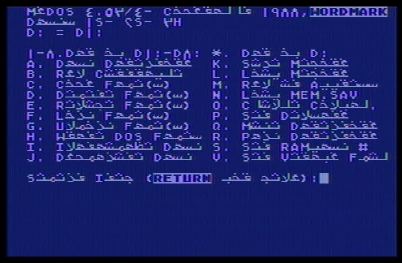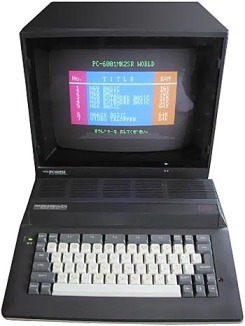The history of home computer hacking seems to be very centered around Europe, US and Australia. But it’s important to not forget other regions. I’ve previously written about C64 cracking in Argentina, but there’s lots more to research about e.g Asia, Africa and the Middle East. After reading this blogpost I got in touch with Salwan Asaad, who told me more about the early days of home computing in Basrah, Iraq. As it turns out, it was similar to what I grew up with: platform wars, competitions, floppy swapping and meetings. Salwan:
Annual school competition on a local and national level in students developed demos [..] Gaming circles: I met many enthusiasts back then at the arcades, we used to gather up and go to arcades to play, talk, and exchange floppies. The last such gathering took place around 2001
While other arabic countries settled for the MSX-computers, which Salwaan refers to as “the enemy”, Iraq developed a unique series of computers called Al-Warkaa (or Al-Warka), named after an ancient babylonian city in Iraq. There were two popular models, which were both based on Japanese home computers. Unfortunately, I haven’t been able to find any photos of them but Salwan told me that it looked like the NEC-ones, but in white instead of black. (photo from old-computers.com)
The Al-Warkaa PC-6002 was the Iraqi version of the Japanese NEC PC-6001 Mk2 SR. Soundwise, it used the the common AY-soundchip but I found a similar model that had a built-in speech synthesis (yeah!). It was probably the first home computer that could sing (my YouTube-playlist).
The Al-Warkaa, unfortunately, didn’t have this feature. Instead, it offered an extra soundchip (probably FM, judging from what Salwan says) with 3 voices. It had 12 preset sounds and also the ability to make custom sounds. A home computer with both FM and PSG built in! It seems that the NEC also was able to combine FM and PSG, just look at this great demo!
The Al-Warkaa PC-6002 had seven different BASIC-versions built in. One of them (mode 7) was the Arabic text mode – a complete arabic text editor with abilities like searching, replacing, printing, and could even format floppies, according to Salwaan.
Unfortunately, Salwan doesn’t know of any text art on the Al Warkaa. I haven’t seen much arabic text-mode stuff at all, actually (if you know of any, please get in touch). To get an idea of the possibilities though, here’s a chart showing how the characters looked in the MSX-computers (copied from msxblue).
The platform battle in Iraq was between MSX and Al Warka. Atari also released arabic computers (and ROM-upgrades for hebrew), like the rare Najm 65XE from which the first picture is from. The most popular MSX-version in Arabia was the MSX 170 which was called Al-Sakhr (“the rock”). While MSX was popular in many different countries, the Al Warkaa was mostly found in Iraq. MSX-users had professional Arabic manuals at hand, but the Warkaa’ers relied on photo-copied English manuals that were mostly focused on BASIC. Salwaan writes:
That’s kinda how Warka guys ended up losing in most head-to-head competitions to MSX guys, the best we can do is draw stuff using BASIC commands and may be binary-load an image from disk to accelerate displaying bitmaps a little. They were doing hardware-sprites and full-motion graphics…
If anyone reading has more knowledge about arabic demos or text-mode things, feel free to leave a comment or e-mail info at goto80 dot com. Finally, a big thanks to Salwan Asaad for sharing this!



May 2, 2012 at 4:35 am |
[…] 64 and ZX Spectrum, but in the Middle East an entirely different format war was taking place. Chipflip took a look at the early home computer scene of Iraq, where the domestic Al-Warkaa series took on the Japanese […]
May 2, 2012 at 4:37 am |
[…] 64 and ZX Spectrum, but in the Middle East an entirely different format war was taking place. Chipflip took a look at the early home computer scene of Iraq, where the domestic Al-Warkaa series took on the Japanese […]
May 2, 2012 at 4:41 am |
[…] 64 and ZX Spectrum, but in the Middle East an entirely different format war was taking place. Chipflip took a look at the early home computer scene of Iraq, where the domestic Al-Warkaa series took on the Japanese […]
May 2, 2012 at 10:46 am |
[…] 64 and ZX Spectrum, but in the Middle East an entirely different format war was taking place. Chipflip took a look at the early home computer scene of Iraq, where the domestic Al-Warkaa series took on the Japanese […]
January 25, 2013 at 6:52 pm |
[…] Al-Warka, um computador iraquiano. […]
August 29, 2014 at 6:20 pm |
If I recall correctly, it looked like the white version PC-6001MKII. MSX was also available in Iraq. it is just the government electronic company assembled this model. Likely in contract with NEC. (it’s wrong to say based on NEC 6001, because it was NEC 6001). in fact almost there is no difference. The Arabic characters in fact was broken. you needed a cartridge to be able to type in Arabic correctly. The screenshot you have of Arabic in fact, broken Arabic.
NEC-6001 Al-Warkaa was a fail computer. has very little software in the country. but schools that had computer classes used them. Arab countries who chose MSX were right. I personally had MSX at home at that time.
There was a newer version of Warkaa that was much better but with limited units sold. I wonder now if it was based on PC-8801 (not sure)
December 27, 2014 at 4:19 pm |
Noticing that you were an MSX owner and you attacked PC-6001 in your comment I guess the battle continues ;)
Mode 6 on PC-6002 (N66SR BASIC) was much faster probably as fast as MSX 2 and had higher quality graphics modes than mode 5 (real 320×200 with 16 colors and 640×200 with 4 color palette) as well as more available memory for programs. It is the only mode that provided access to the FM chip mentioned in the post and it also supported a higher floppy disk format on BE disk drives (there were two drive types: B and BE). Mode 5 formats floppies to 159KB capacity but I’ve had a pre-formatted floppy with 360KB accessible from mode 6 only and never figured out how to format to 360KB myself. I’ve heard rumors of 720KB format on BE drives in mode 6 but never seen one myself.
To this day I don’t understand why Mode 6 was so noticeably faster. There could be a faster on-board CPU for it or that the Z80 running in Mode 5 could somehow run faster when in Mode 6?
That being said, very few programmers actually used Mode 6 or recognized its advantages. Mode 5 and mode 6 weren’t compatible and almost all Al-Warkaa owners (and schools) had PC-6001 and B drives so even though I used Mode 6 for my “cool” projects, public demos were always made to run in Mode 5 and B disk drives.
I have so much information about this computer to this day! I gotta put what I remember somewhere before I forget it all.
Oh, for comparison here’s how PC-6001 Mk2 (identical to Al-Warkaa PC-6001) startup menu looked like:
And here’s PC-6001 MkII SR (identical to Al-Warkaa PC-6002 with missing mode 7, the text editor):
December 27, 2014 at 4:21 pm |
Oh screenshots didn’t show up so here are links instead:
PC-6001: http://imgur.com/ElZwiYX
PC-6002: http://imgur.com/jxlsEs0
December 27, 2014 at 5:20 pm
Excellent, thanks so much for the input!
Do you know of any text graphics (“ascii art”) that was made with the Al-Warkaa?
November 23, 2016 at 6:42 pm |
Please visit these pages to see a picture of Al-Warkaa computer.
https://m.facebook.com/groups/997385753721303?view=permalink&id=1017231201736758&ref=content_filter
https://m.facebook.com/story.php?story_fbid=452044695003298&id=100005933133597&ref=content_filter
https://m.facebook.com/story.php?story_fbid=798522003617903&id=100003803333034&ref=content_filter
November 23, 2016 at 7:04 pm |
thanks!